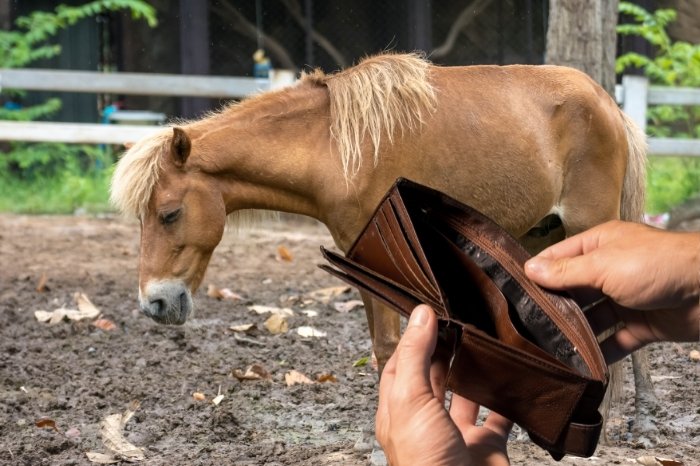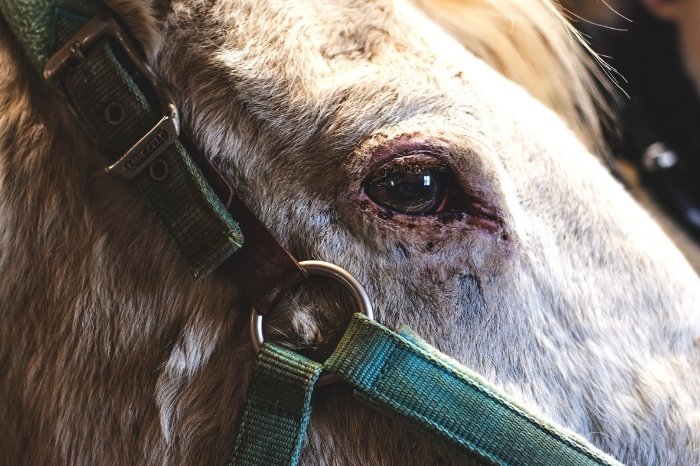Last Updated on April 17, 2023
As a horse owner, you may be told that you need to get a Coggins test for your horse. But how much is a Coggins test, and why is it recommended?
A Coggins test is one of many healthcare requirements of keeping a horse. Let’s take a look at what this important test is and find out why you need one for your horse.
What is a Coggins Test for Horses?
A Coggins test is a blood test used to screen horses and ponies for Equine Infectious Anemia (EIA). A Coggins test can identify if a horse is carrying antibodies for this disease. Although there are other tests available for EAI, the Coggins test is the most popular and well-known.
The name of this test comes from its developer, Dr. Leroy Coggins. Dr. Coggins was a virologist who first studied African Swine Fever in Kenya in the 1960s. He used the results of this research to develop his now-famous test for EIA.
What is equine infectious anemia?
EIA is a viral disease that can affect all equines – horses, ponies, donkeys, and zebras. The virus is carried in the blood and is normally transmitted through contaminated blood. This occurs when insects bite an infected horse and then move on to bite other horses.
EIA causes varying levels of symptoms in horses. Horses with acute EIA will show signs such as fever, weight loss, and disorientation. In some horses with EIA, rapid death has been reported.
The biggest concern about EIA is that there is no cure for it and no vaccine. It is also spread very easily, particularly in areas where many horses are kept together or congregate.
The other problem posed by EIA is that some horses can become infected and never show any symptoms. These horses then become carriers of the disease and pose a huge health risk to other horses around them.
Why Do You Need a Coggins Test for Horses?
Luckily, the incidence of EIA in the U.S. is relatively low. Not many horses test positive for this disease, which may make you wonder if you need to get your horse tested at all.
Manna Pro Simply Flax for Horses | Omega-3 Fatty Acids from Flaxseed | 8 Pounds
Firstly, it may be mandatory for you to have your horse tested to transport him – this is often also required to move a horse from state to state. Once a test has been done, it is valid for 6 to 12 months provided that an official certificate has been issued.
There is very little variation in the Coggins test requirements by state – currently, all states require that you have a negative Coggins test certificate for your horse for it to cross state borders. However, these guidelines are always subject to change, so it is vital to always check on the local requirements in your area before traveling with your horse.
Another reason why you may need a Coggins test for your horse is if you wish to enter equestrian events. Any occasion that is classed as a private or public assembly of horses is subject to regulation by the local department of agriculture, so even boarding stables may require a negative EIA test certificate before your horse can move onto the premises. Other events subject to these rules include rodeos, group trail rides, racetrack events, exhibitions, shows, and fairs. The organizer of these events must keep a record of the relevant paperwork for at least two years after the event.
Any horse that is intended to be used for breeding must have a negative Coggins test certificate, but their offspring are exempt for the first six months of life. The requirement for a test still applies even if the horses will not leave the premises during the breeding process.
The final reason to have a Coggins test is to help eliminate this fatal disease. If your horse is a carrier, he may be infecting other horses without you even realizing it. Regular testing for EIA can help to give you and your horse-owning friends the reassurance that your equines are all free from this incurable disease.
How Much is a Coggins Test for Horses?
The cost of a Coggins test itself is relatively inexpensive. Typical laboratory fees for a Coggins test for horses cost from $8.50, so this regular health check will not break the bank.
However, the more expensive element of having a Coggins test is the fees involved in getting a veterinarian to take the sample. For a Coggins test, a veterinary professional must draw blood from your horse, process the sample, and send it to the laboratory. This is not something you can do yourself, so you will need to pay the veterinary fees required.
How much this will cost depends on several different factors. You will need to pay a fee for the veterinarian to visit your premises and another fee for the blood sample to be taken. Many veterinary clinics also charge a fee for the sample to be processed, to cover the cost of packing and posting the sample, and reporting the results.

However, there are some ways you can reduce these costs. Firstly, if the veterinarian is visiting a group of horses, the attendance fee will be divided between you. Alternatively, you could take your horse to the clinic to eliminate this fee.
Many horse owners get a sample taken for Coggins testing at the same time as other regular health checks and procedures. For example, you could ask your veterinarian to do your horse’s spring vaccinations at the same time as drawing blood for Coggins. This means you only need to pay one attendance fee to get both things done.
How long does a Coggins test take?
Drawing a sample of blood for a Coggins test is a very quick process – it can be done in a matter of seconds. However, processing the sample and performing the test can take much longer.
The reason for this is that the sample must be sent to a state-approved laboratory that is permitted to issue certificates for negative Coggins tests. So, once your veterinarian returns to the clinic, the sample must be packaged safely and mailed to their laboratory of choice. These samples are normally sent via a next-day delivery service to ensure they do not deteriorate in the mail.
Once at the laboratory, the sample will be processed and the Coggins test will be performed. The average turnaround time for a Coggins test is 2 – 7 days, depending on when it arrived at the laboratory. Smaller laboratories may only run batches of Coggins tests on certain days of the week, while large laboratories might do them every day.
If you are in a rush for a negative Coggins test certificate, perhaps because you want to travel with your horse or enter an equestrian event, some laboratories will provide results within 24 hours for an additional fee.
When the test results come back negative, the laboratory will issue a certificate to state that your horse is negative for EIA. It is important to take this certificate with you whenever traveling with your horse or attending an equestrian event. Many laboratories issue a digital version of the certificate, making it easy to store on your mobile phone.
It is important to remember that if the horse is sold, the negative Coggins test must be transferred to the new owners. Some local authorities advise that the test must be dated within 90 days of the sale of the horse, so it may be necessary to have the test redone before you sell your horse.
What Happens if a Coggins Test is Positive?
Unfortunately, if a horse test positive for EIA the outlook is not good. This disease has no cure and is highly contagious – an infected horse will be contagious for life. Most horses that test positive for EIA do not show symptoms, but they can pass on the disease to other horses with often fatal consequences.
Sadly, this means that most horses that are diagnosed with EIA are euthanized. Theoretically, they could be quarantined to reduce the risk of infection to other horses, but this is very difficult. EIA is transmitted by air-borne insects, and the risk of these moving from an infected horse to other non-infected horses is very high.
In some cases, horses with EIA may be transported to a research laboratory to help researchers in their effort to find a vaccination or treatment for this disease. But in most cases, a positive Coggins test results in the euthanasia of the horse.

Summary – How Much is a Coggins Test?
So, as we have learned, a Coggins test is required to screen your horse for a highly contagious and untreatable disease called Equine Infectious Anemia. The cost of this test is under $10, but there will be additional veterinary fees to pay on top of this. It is a good idea to get your horse tested as you may need the certificate to travel with your horse to equestrian events.
We’d love to hear your thoughts on the cost of a Coggins test! Perhaps you have experienced a horrible situation when a horse tests positive for EIA. Or maybe you have some questions about the cost of healthcare for your horse? Please add your comments below and we’ll get back to you!

Kate Chalmers is a qualified veterinary nurse who has specialized in horse care for the vast majority of her career. She has been around horses since she was a child, starting out riding ponies and helping out at the local stables before going on to college to study Horse Care & Management. She has backed and trained many horses during her lifetime and competed in various equestrian sports at different levels.
After Kate qualified as a veterinary nurse, she provided nursing care to the patients of a large equine veterinary hospital for many years. She then went on to teach horse care and veterinary nursing at one of the top colleges in the country. This has led to an in-depth knowledge of the care needs of horses and their various medical ailments, as well as a life-long passion for educating horse owners on how to provide the best possible care for their four-legged friends.
Kate Chalmers BSc (Hons) CVN, Dip AVN (Equine) Dip HE CVN EVN VN A1 PGCE

